Name a famous Geordie and you’ll find a local hero who feels they underachieved by staying in the region, or an ex-pat tussling with the guilt of catching the slow train out of Central Station. We’re a confusing group of people here in the north east.
It fascinates me that Brian Johnson of AC/DC says staying in Newcastle after he became famous was the dumbest thing he ever did, that Viz creator Chris Donald grew up within a mile of the city centre yet felt he couldn’t call himself a Geordie, and that Sting and Robson Green have talked of a sense of escaping their hometown.
This peculiar personality tic – that I’ve christened Akenside Syndrome after a similarly demure son of Tyneside – is a condition of feeling ambivalent towards the region despite often retaining a strong emotional bond with and/or sincere affection for the area. It’s a universal theme for sure, but a particularly virile variant exists in the north east of England.
Members of the Geordie diaspora are particularly prone to Akenside Syndrome, in part because they are faced with a no-win situation. Leave the north east and don’t talk it up, say how much you love it, or call it God’s Own Country, then you’re a traitor. Do all of the aforementioned without retaining a base in the area, then you’re a hypocrite.
It was my own experience of such feelings that led me to write Akenside Syndrome: Scratching the Surface of Geordie Identity, in which I seek to engage with the ongoing reinvention of the city region and empower individuals – particularly those who may have felt disenfranchised from traditional perceptions of what it has meant to be a Geordie – to feel proud of where they came from, without guilt or worries of being called a traitor.
We have a unique culture in Tyneside: we need to champion it in order to broaden and strengthen civic identity.
In some ways we’re too stuck in the past, unable to see how our culture has changed. The concept of “Geordie” was rigid for too long, breeding a sense of exclusion and alienation in those who neither believed nor felt they wanted to fit into such a narrow one-size-fits-all definition. The focus in my book is on potential alienating aspects of the culture from within, and themes that emerged included an ambivalence towards education, bullying, introversion, pressure to play up to stereotypes, cultural narrowness and Tall Poppy Syndrome (a communal desire to bring individual achievers back down to earth).
But underlying all this is the historic sense of isolation and lack of political self-assertion in the area. In an era of unprecedented devolution we remain a largely passive, powerless region, unable to coherently articulate what we want and need; destined – if we are not careful – to get what we are given rather than what we demand. We’re happy to complain about our lot amongst ourselves but less able or willing to harness this discontent to generate real change that is so clearly needed.
I recently read somebody talking of Geordies being uncomplaining as if that were a good thing. In reality it’s part of the region’s problem. Until we can achieve some semblance of political control over our own destiny, the Geordie diaspora will continue to fan out and Akenside Syndrome will continue to proliferate.
Many things hold us back from without but from within there remains a nostalgic, innately conservative, defensive rump of people yet to be won over to a new conception of themselves or their city and region; their politicised view of what being a Geordie means forever stuck in the past.
We should be proud of our heritage of course, but as Orwell said in The Lion and the Unicorn: “Nothing ever stands still. We must add to our heritage or lose it, we must grow greater or grow less, we must go forward or backward.”
Some Geordie ex-pats always seek out the old and familiar when returning home, but while I embrace our history I always tend to search for the new. Be it in the arena of the arts, architecture, science, engineering, restaurants, bars, I’m never disappointed.
I believe in Tyneside, and I believe that we shall go forward.
Joe Sharkey is the author of Akenside Syndrome: Scratching the Surface of Geordie Identity. He splits his time between Petersfield, in Hampshire, and Newcastle. You can follow him on Twitter: @jajosabooks
Do you agree with this assessment of Geordie identity? Tell us in the comments section below – by clicking on the little plus sign.
(Views expressed on our website and in our magazines and emails are not necessarily endorsed by Northern Correspondent.)

